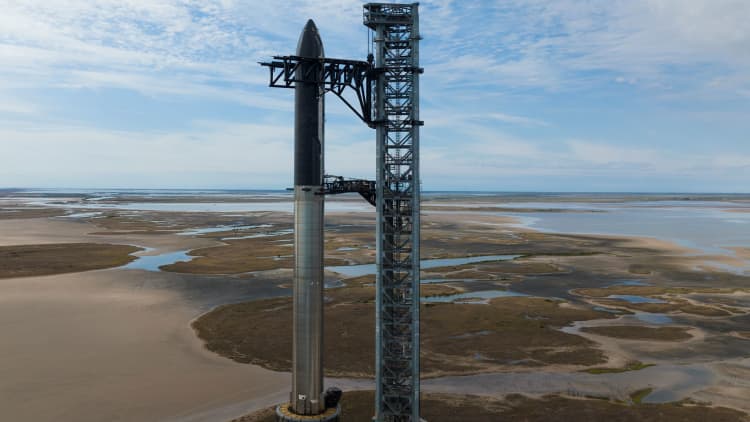An Impulse employee assembles a Mira vehicle.
pulse space
Los Angeles-based space startup Impulse, led by famed rocket scientist Tom Mueller, has raised $150 million in a new round of funding led by venture capital firm Founders Fund.
Impulse is expanding its product line of orbital transportation vehicles (commonly known as “space tugs”) and is building two so far, the smaller Mira and the larger Helios.
Rockets carry satellites and payloads into orbit, just as planes carry passengers to metropolitan areas, and space tugs carry them to specific destinations, just as taxis take passengers home from the airport.
Mueller, SpaceX's first employee who spent nearly two decades developing engines for CEO Musk, told CNBC the funds will ensure Impulse Space's future. Mueller founded Impulse three years ago after leaving SpaceX and leads the company as CEO.
“This means we have enough funds to develop Helios and the upgraded Mira and complete the first flight of both products,” Muller said.
Tom Mueller delivers the commencement address at the University of Idaho in 2018.
University of Idaho
Impulse carried out its first mission, called LEO Express-1, using the Mira vehicle to carry and deploy a small satellite. Pulse was launched in November, and after a series of additional demonstrations, the mission was declared a complete success in July, with Mueller deeming it “probably the most successful orbital transfer vehicle debut in history.”
“That success has really helped with this raise and all the customer engagement we're getting,” Mueller said.
The company has a backlog of contracts from commercial and government customers—from standard satellite deliveries to building propulsion systems for private space stations to demonstrating the capabilities of its Helios vehicle in distant geosynchronous orbit for the U.S. Space Force.
Numerous venture capital investors have joined the company in its $150 million funding round, including: Airbus Ventures, Alumni Ventures, Balerion Space Ventures, Lux Capital, RTX Ventures, Spring Tide, Tamarack Global, 137 Ventures, DCVC, Elysium, Firstprinciples Group, Island Green, Overmatch and Trousdale Ventures. The new round brings Impulse's total funding to date to $225 million, the company said.
A Mira vehicle orbits during the LEO Express-1 mission, due to launch in November 2023, and several pairs of Saiph thrusters are visible.
pulse space
Impulse's next mission is LEO Express-2, scheduled to launch later this year. The company said it then plans to launch an updated version of the Mira vehicle in late 2025, a demonstration mission with Helios in mid-2026, and the first “GEO Rideshare” mission in 2027.
Conquer reusable rockets, starship or not
In Mueller's view, while SpaceX has lowered the cost of launching materials into orbit, there is a lack of space delivery systems on the market. Greater launch capabilities are coming, with large reusable rockets in development rocket labBlue Origin, Theory of Relativity, etc.
“For any customer who wants to move something in space, there are substantial cost and efficiencies to be gained with a reliable solution,” Mueller said.
A Mira vehicle at the company's Redondo Beach headquarters.
pulse space
While Mueller said his original intention for Impulse was “really based on my belief that Starship could be commercialized,” he noted, “Now we're finding out that (SpaceX) probably won't fly commercially for the next five years, and there's not much Many opportunities.
SpaceX continues to develop its massive Starship rocket system, conducting increasingly ambitious test flights with prototypes. Whether it's deploying its own Starlink satellites or flying high-profile moon missions for NASA, the rocket is critical to the company's future.
“Currently, (we will) fly using Falcon 9 and medium-lift launch vehicles,” Mueller added.
Impulse, headquartered in Redondo Beach, Calif., currently has about 140 employees and plans to expand to more than 200 employees next year to expand production of Mira and Helios. The company does much of its design, manufacturing, assembly and even engine testing at its 60,000-square-foot facility.
Mueller noted that the current Impulse facility allows the company to expand production of at least 10 Mira spacecraft a year before expansion is needed.
“We feel good right now. (The fundraising) is behind us, so now we're putting our heads down and making progress,” Mueller said.



